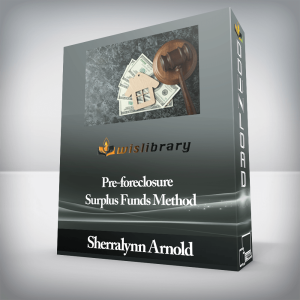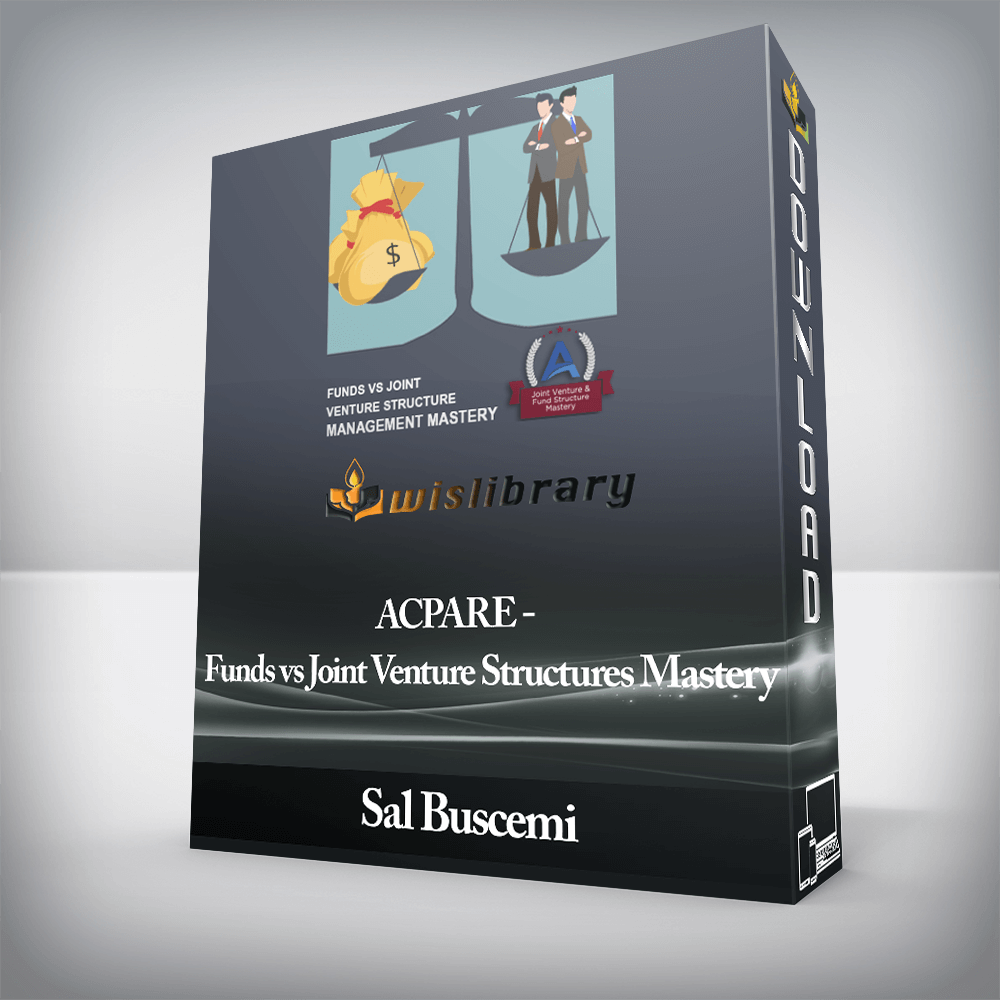Sal Buscemi – ACPARE – Funds vs Joint Venture Structures MasteryHow To Become A Certified  Real Estate Private Equity Fund and Joint Venture Structure SpecialistAt Last! You’ll Have a Step-By-Step Formula and System To…STRUCTURE A COMMERCIAL REAL ESTATE FUND OR JOINT VENTURE –  REGARDLESS OF EXPERIENCE.In fact, very few people actually know the difference between these two major structures and fail to get any institutional investor to listen to them because they don’t know how to structure before the pitch. And if you don’t know these differences, and when and why they are used, then you have no right talking to anyone about your deals. Period. Professionally, you’ll never be a “grown up†investor because you don’t speak the same language of high finance as institutional investors will expect you to know. They will qualify and judge you – not on your credit or income – on yourIntellectual capital.The differences you’re expected to know are:  Discretion and control How Promotes And Crossed Promotes Are Calculated Investor Profiles: LPs vs Institutional Equity Realization Timeline For Your Fund or JV Capital Stacks When Profits Are Paid: Current Pay vs Accrual Pay Profits Structures: Straight Line vs. IRR Look Back vs. Fixed Exit Fee vs. IRR Waterfall    And in today’s cynical market, it’s not enough to simply be an “investor.â€Â If you want to add value, you need to know how to structure solutions around opportunities. You need to focus on being a Transactional Specialist. Opportunities always exist, in up markets, and down markets.You need to SPECIALIZE.As a Real Estate Fund and JV Transactional Specialist, you set yourself apart from every single investor in your market. You send a crystal clear message to your prospects that you have a thorough understanding of their needs and concrete solutions to their problems. As a certified specialist, you grab the lion’s share of deals, you attract the BEST clients, and you command much higher fees for your services and expertise. And when you specialize, you automatically position yourself as THE expert and authority in your market. And that leads effortlessly to attracting investors, capital, and deals. The cold, brutal truth of the matter is…INSTITUTIONS, LENDERS, SPONSORS, AND OPERATORS NEED SOMEONE LIKE YOU TO TRUST AND DEPEND ONAnd to be that investor, that deal maker, that intermediary, that transactional specialist, you simply need the right training to make it happen. And that’s exactly what you get in this Real Estate Fund and Joint Venture Master Class and ACPARE Certification Program. ACPARE® – Association of Capital Placement Agents for Real Estate – is the country’s gold standard for commercial real estate investing training and education. You’ll be uniquely qualified to help you & your clients identify, analyze, execute and confidently structure real estate funds and joint venture opportunities. And more importantly, you’ll avoid horrible deals, be able to place capital and structure the risk away from your investors.Specifically, in this Mastery Class, you’ll learn:When exactlyto use a fund structure vs. when to use a joint venture structure (hint: novices will shoot themselves in the foot immediately out of the starting gate with this one…)The 6 Major Differencesbetween funds and JVs… and how they are structured.Understanding the capital structure (that your investors will expect you to know… and most SEC attorneys don’t know!)What terms of the deal you need to negotiate – so you come out ahead every single time.How will profits be shared (pari pasuor subordinated)? How is the ownership structured? Who has upside potential? Who has downside risk? The “hard questions†you better be able to answer!What the JV Equity Waterfallis and how it’s structured. Easily!How to command instant credibility in your negotiations by understanding pay structures and when to use each.What the 3 Defining Metricsof a deal are and when to use them (prior to going in.)Different Types of Equity (not all equity is equal). Avoid this one type of equity at your own peril!Punitive Clauses for Operators and Sponsors(control shifts, claw backs, “bad boy†clauses, and other “carrots and sticksâ€)The 4 Profit Participation Structuresand which one matters the most to which investorHow to settle partnership disputes– amicably – that saves tens-of-thousands in legal fees and personal griefWhat the 5 Critical Investor Transaction Selection Criteriafor guaranteed fund success and how these will help to structure the risk away from you and your investors and sponsors.Why you should avoid a “pledge fundâ€and 2 other types of structures that will cost thousands in legal fees and will give you – NOTHING.What it means to “call the capital†and how it’s done – and what to do if someone defaults…The 4 important parts of your fund’s business strategy your investors expect you to detail in your pitch book.Which of the 3 fund return metricsyou must report on and when (before money is taken out or after?)The 4 Different Possible Fund Structuresthat are most commonly used and how they are structured.Understanding your fund’s economics: whenyou get paid, and how you get paidPromotes explained and the 6 Key Drivers For Your Fund’s Promotesand how they are EASILY calculated and how much you and your investors get.Knowing who the players in your fund and how all those “LPs†interactFund legal structures you’ll need to know prior to papering the dealWhere the institutional moneyis for the smaller balance fund manager (Yes, it exists!) and how to raise it effortlessly.How to structure a great partnership using these 4 criteria – and asking these 4 hard questions before getting married into any partnershipAs an ACPARE Certified Fund & Joint Venture Transactional Specialist, you’ll be first, foremost, and front-and-center in the minds of your local and regional investors, lenders, and property owners when it comes to hiring you to structure deals, place capital, and create true value.Perhaps even more critical, is that you’ll be able to profit handsomely by bringing institutional money into smaller deals that your local operators desperately need because lenders and banks stopped lending to them.To become a Fund and Joint Venture Transactional Specialist, just choose your program and then follow 3 Simple Steps… How Does It Work?Step 1. Take the CourseThe Funds vs Joint Venture Structure Mastery course is 2 hours of video training lessons plus 12 handout downloads. You also get flowcharts and cheat sheets for quick, easy reference, plus 6 module-specific quizzes and a final exam.Step 2. Pass the TestAt the end of each module, you’ll take a brief quiz to ensure you have an understanding of the content and basic concepts covered in the lesson. Once you’ve completed all the quizzes, you’ll then take an online final exam.Upon successful completion, you’ll earn you Funds vs Joint Venture Structure Mastery Certification!The exams are designed for your success. They’re not “tricky†(no SAT goofiness)… yet they do test your knowledge and comprehension of the material. A passing grade is 80. You can take the exam 3 times. If you don’t pass after 3 attempts, simply go back through the module prior to taking the test again.The exams are not timed. They consist of 60 multiple choice and true/false questions. Allow 45-60 minutes to complete the exam. If you can complete the exam is a single sitting. Answers are saved if you need to finish at a later date.Step 3: Display Your BadgeUpon successful completion of the course and exams, you’ll receive a personalized certificate and badge.Display your badge on your website, in your email signature, community portals, on your blog, and especially in your Linkedin profile and Twitter status.AND…your digital certificate is full color, so frame it and display it proudly in your home and office. Here’s What You’ll GetWhen you enroll today, you’ll get:The Real Estate Fund and Joint Venture Mastery Course6 Core Lessons35 Modules12 Handouts6 Blueprints6 Review QuizzesFull Easy-To-Reference ManualPLUS, upon successful completion of the course and all the quizzes and final exam you’ll receive:A Wall Street grade ACPARE badgedesignating you as a Certified Fund and Joint Venture Transactional Specialist that you can display on your website, email signature, and LinkedIn® profileAn ACPARE certificatefor framingStatus and recognitionas a Certified Real Estate Fund and Joint Venture Transactional Specialist…is DifferentAre there other courses out there on Stabilized Property investing? Probably. But you won’t find anything that comes close to what you’ll get with this training.The difference is, all of us here at The Commercial Investor, including our students and partners, are actual investors, in the trenches every day.We raise capital, place capital, analyze and structure deals, buy and sell property, negotiate with institutions, home offices, and lenders, and pitch the ‘big boys.’So…does this sound exciting to you? Is this something you want to be part of? If your answer is ‘yes,’ then you’re in the right place. Course Details and DescriptionCourse Breakdown:Lesson 1: Start Here1.1 Orientation1.2 Here’s What to Expect1.3 Types of Commercial Real Estate Transactions1.4 Types of Capital (Capital Structure)â– Â First Trust Debtâ– Â Mezzanineâ– Â Equity High Leverage Mezzanine Preferred Equityâ– Â Hard Money / Bridge Loans / Distressed / Value-Added Financingâ– Â Debtor-In-Possession Loans (Dip)â– Â Super Collateralized Loans (Super C)Lesson 2: Joint Venture Equity – Part 12.1 JV Equity Partners Overview (Understanding Who the Participants Are)2.2 JV “Pari Pasu“ Equity2.3 JV Profit Participation Overview2.4 JV Equity Waterfall: Full Stack Vs Normal Stack2.5 JV Promote StructuresLesson 3: Joint Venture Equity – Part 23.1 JV Metrics to Understand3.2 JV Punitive Clauses for Operating Partners3.3 JV Profit Participation Structures3.4 JV Residual Strategies for Existing Joint Venture DealsLesson 4: Fund Structure – Part 14.1 What Is Private Equity4.2 Capital Formation: Calling the Capital4.3 Capital Fomration: Business Strategy4.4 Capital Formation: Fund Investments4.5 Fund Returns4.6 Fund Terms4.7 Commonly Used Terms4.8 Institutional Rules of Engagement4.9 Possible Fund StructuresLesson 5: Fund Structure – Part 25.1 Fund Economics5.2 Key Drivers for Promotes5.3 Not All LPs Are Created Equal5.4 Lead LP Investment Rights5.5 The Players in Your Fund: GPs Vs LPs5.6 The Due Diligence Interrogation Process5.7 Legal Structure5.8 Where the Money Is5.9 Investor Transaction Selection Criteria5.10 The Fund of Funds StructureLesson 6: Understanding How Partnerships Work6.1 Partners or Friends6.2 How to Create a Great Partnership6.3 Ask the Hard QuestionsMore specifically, in this Mastery Class, you’ll learn: When exactly to use a fund structure vs. when to use a joint venture structure (hint: novices will shoot themselves in the foot immediately out of the starting gate with this one…)The 6 Major Differences between funds and JVs… and how they are structured.Understanding the capital structure (that your investors will expect you to know… and most SEC attorneys don’t know!)What terms of the deal you need to negotiate – so you come out ahead every single time.How will profits be shared (pari pasu or subordinated)? How is the ownership structured? Who has upside potential? Who has downside risk? The “hard questions†you better be able to answer!What the JV Equity Waterfall is and how it’s structured. Easily!How to command instant credibility in your negotiations by understanding pay structures and when to use each.What the 3 Defining Metrics of a deal are and when to use them (prior to going in.)Different Types of Equity (not all equity is equal). Avoid this one type of equity at your own peril!Punitive Clauses for Operators and Sponsors (control shifts, claw backs, “bad boy†clauses, and other “carrots and sticksâ€)The 4 Profit Participation Structures and which one matters the most to which investorHow to settle partnership disputes – amicably – that saves tens-of-thousands in legal fees and personal griefWhat the 5 Critical Investor Transaction Selection Criteria for guaranteed fund success and how these will help to structure the risk away from you and your investors and sponsors.Why you should avoid a “pledge fundâ€Â and 2 other types of structures that will cost thousands in legal fees and will give you – NOTHING.What it means to “call the capital†and how it’s done – and what to do if someone defaults…The 4 important parts of your fund’s business strategy your investors expect you to detail in your pitch book.Which of the 3 fund return metrics you must report on and when (before money is taken out or after?)The 4 Different Possible Fund Structures that are most commonly used and how they are structured.Understanding your fund’s economics: when you get paid, and how you get paidPromotes explained and the 6 Key Drivers For Your Fund’s Promotes and how they are EASILY calculated and how much you and your investors get.Knowing who the players in your fund and how all those “LPs†interactFund legal structures you’ll need to know prior to papering the dealWhere the institutional money is for the smaller balance fund manager (Yes, it exists!) and how to raise it effortlessly.How to structure a great partnership using these 4 criteria – and asking these 4 hard questions before getting married into any partnership  There are no reviews yet.Add a Review Cancel replyYou must be logged in to post a review.
 Kendra Barnes – The Real Estate Summit II
₹16,102.00
Kendra Barnes – The Real Estate Summit II
₹16,102.00
 Sherralynn Arnold – Pre-foreclosure Surplus Funds Method
₹8,632.00
Sherralynn Arnold – Pre-foreclosure Surplus Funds Method
₹8,632.00
Sal Buscemi – ACPARE – Funds vs Joint Venture Structures Mastery
₹18,592.00





